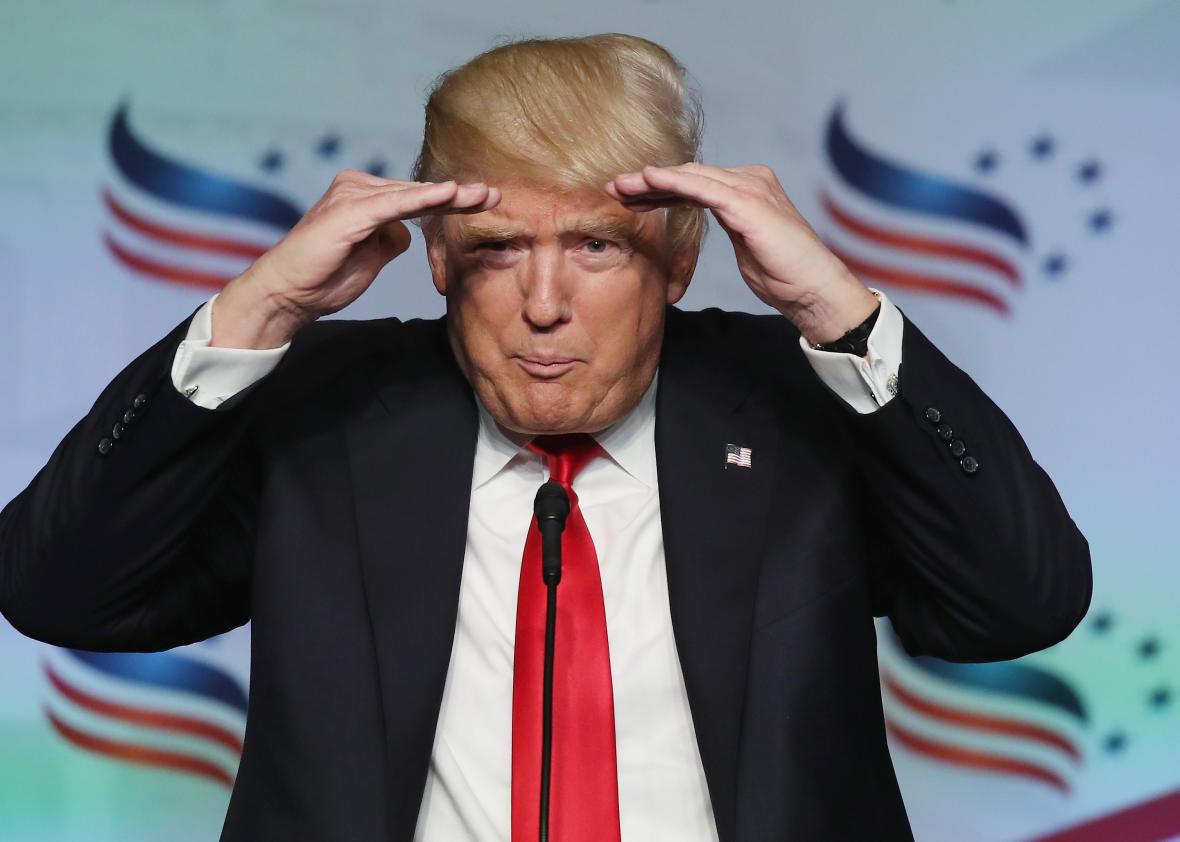Donald Trump is not a master of oratory. Within speeches, he meanders. From speech to speech, he repeats himself. Nobody cares. The point of his performances is that you can see him thinking, acting, in real time. You can see the struggle and the exertion.
There’s one word, in particular, that he uses as a walking stick as he clambers up the rocky face of cognition: maybe. Nine times out of 10, he uses it like a normal person (well, a normal fascist person). It’s often placed at the beginning of a sentence, where it seems conversational, like the reply to a question. It can carry an air of mischief, provocation, or heresy. “Maybe he should have been roughed up.” This is a Level 1 Maybe. Many (nowhere near all) of Trump’s most heinous accusations, over the years, have been leavened with such a maybe. “He doesn’t have a birth certificate. He may have one but there’s something on that, maybe religion, maybe it says he is a Muslim. I don’t know. Maybe he doesn’t want that. Or he may not have one.”
A Level 1 Maybe is premeditated. A Level 2 Maybe may be—or not. After the shooting in Orlando, Florida, Trump suggested, as he often does, that Obama was soft on terrorism: “There are a lot of people that think maybe he doesn’t want to get it. A lot of people think maybe he doesn’t want to know about it. I happen to think that he just doesn’t know what he’s doing. But there are many people that think maybe he doesn’t want to get it. He doesn’t want to see what’s really happening.” We’re still in the realm of the normal, but there’s something maybe a little anxious about these maybes. They are maybe a little cautious. They reflect the uncertainty of inventing fake thoughts and ascribing them to “many people.”
Which brings us to the rare Level 3 Maybe, my favorite maybe in the world. This maybe is so weak, so unexpected that it often requires an additional modifier to prop it up. It erupts in the middle of sentences, without regard to the surrounding syntax. It is a verbal fart. At the first Republican primary debate, Trump told Megyn Kelly, “I’ve been very nice to you, although I could probably maybe not be, based on the way you have treated me.” It was like watching someone almost fall off a bicycle. Earlier this month, as he felt around in the dark for an opinion on whether people on the terror watch list should be able to buy guns, Trump said that he would talk to the NRA. “I understand exactly what they’re saying. You know, a lot of people are on the list that that really maybe shouldn’t be on the list and you know their rights are being taken away so I understand that.” And at a rally in West Virginia, in May, he addressed coal miners: “I think your industry has probably been hit harder than maybe anybody.” In all these cases, Trump seems to be possessed midsentence by uncertainty.
And yet there is something graceful about the Level 3 Maybe. For one thing, it is so inept that is has a kind of sprezzatura. It is powerful in its condescension. That’s why it feels so threatening and mobsterish when he uses it against Megyn Kelly. Conversely, it can signal humility, reasonableness. At a March rally in Janesville, Wisconsin, Trump said that his political success was “something that has—maybe never happened and they’re saying it’s a phenomenon.” He wants to say that it has “never happened,” tout court, but he also wants to project modesty and caution. (He goes on to say that he’s not a phenomenon, it’s not about him, he’s just a “messenger.”) You can see the beast thinking. And in appearing to move forward and backward at the same time, he conducts a kind of oratorical moonwalk.
Trump is cognitive chaos. He’s careless. And he will lose in November—probably. Maybe. Really.
